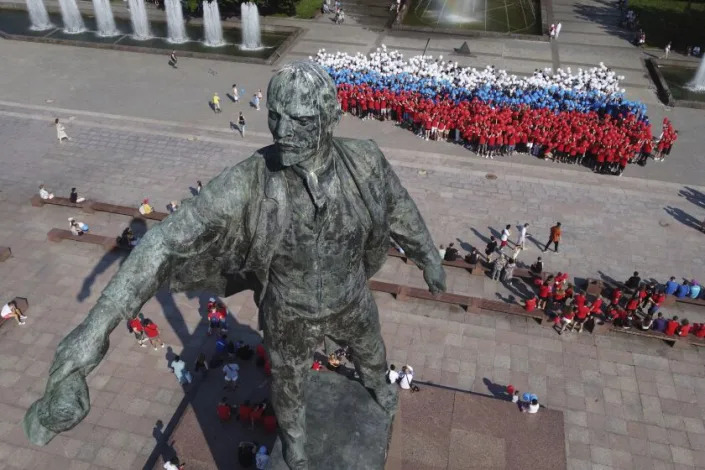Los Angeles Times
Opinion: How long will Russians tolerate Putin’s costly war?
Alexander J. Motyl – February 21, 2023

How much punishment will the Russians take?
Close to a thousand Russian soldiers are dying every day in Ukraine. Victory is nowhere in sight, and tens of thousands — or possibly even hundreds of thousands — more will die before the war ends.
The economy is sputtering, living standards are progressively declining, young professionals have either left in droves or are planning to do so, and every passing day reduces Russia’s prospects of modernization and development.
Russian responsibility for the brutal Putin regime and its genocidal war against Ukraine grows with every arrest of a dissident or draft resister at home and with every Ukrainian death abroad. At some point, collective indifference to suffering and mass murder will begin to register on Russian civilians as collective guilt.
Russia has become a rogue state. Most countries that have historically harbored Russians have closed their doors, and Russian language and culture — traditionally sources of great pride for Russians — have been demoted to instruments of imperial oppression, as Putin has weaponized both.
And yet, almost a year after the invasion of Ukraine, Russians continue to support strongman Putin and the war.
Setting aside the immorality of such a stance, let’s consider only what it says about the Russian people’s will to pursue their own survival. Russia is headed for Armageddon, and yet most Russians, instead of sounding the alarm and doing everything possible to save their country and themselves from destruction, are either busy attending Putin’s rallies or are hiding their heads in the sand.
If Russia does in fact collapse, as many experts in Russia and the West expect it to do, Russians will have themselves to blame. Except for recurrent protests in Moscow and St. Petersburg, they have watched since 1999 as Putin constructed a fascist dictatorship — seizing territory in Georgia in 2008 and Ukraine in 2014, and launching a full-scale invasion of the latter in 2022.
Putin made them feel great again. Putin and his propaganda persuaded them that the West was a monster, that Ukrainians were Nazis, that Russians were helpless victims. Two decades of authoritarian rule by a charismatic leader inured them to non-resistance, to self-doubt, to self-delusions. Centuries of a political culture that fostered just these very attitudes didn’t help.
The Russian citizenry became, as many liberal oppositionists in Russia and Ukraine like to say, “zombified” — the living dead. That metaphor has been taken to a horrific extreme as wave after wave of inexperienced Russians who should not be on the front keep attacking even as Ukrainian troops mow them down.
Putin has also terrified Russians, making it clear that any act of public protest will immediately lead to incarceration or worse. In the past year, the secret police has devastated the small bits of civil society — the autonomous social, political and cultural institutions that promote collective action — that had barely survived two decades of Putin’s iron rule.
As one independent Russian journalist has written using a pseudonym, “in Russia there is no heroism left, whether you stay or leave or go to prison or remain free. Everyone is going into 2023 alone, no matter how many people are around.”
The picture is dispiriting, but not entirely hopeless. Thousands of Russians did take to the streets in the immediate aftermath of the invasion. Russians have firebombed scores of draft offices. The pseudonymous journalist wrote last month: “Many people continue to do important work. Helping the millions of Ukrainians who have ended up in Russia as a result of the invasion — something that I’m involved in. Or feeding the homeless. Supporting one another. Defending political prisoners and writing letters to them.”
The problem is that, as she says, these tens of thousands of people “have no representation.” And Putin, the career KGB officer, knows full well that preventing a vigorous Russian civil society from emerging is the key to his continued misrule in Russia.
If the only thing that promoted civil societies were democratic political cultures, Russia would be hopeless. But, as the post-Stalin “thaw” and Mikhail Gorbachev’s perestroika demonstrate, Russians can act collectively and autonomously when repression is reduced and the threat of immediate arrest recedes. And that’s partly because, even today, many Russians continue to harbor views that are critical of Putin and the regime.
Andrei Kolesnikov of the Carnegie Endowment for International Peace wrote two weeks ago: “Notably popular in Russia right now are classic works of literature that contain subtle antiwar messages. The most read book at the beginning of last year was George Orwell’s ‘1984.’ Other books selling well include those about everyday life in 1930s Germany, in which people recognize themselves and their fears.”
Anti-regime collective action will happen in Putin’s Russia only if he goes and a power struggle reduces the regime’s ability to crack down — or if Russia gets a beating in the war. In both cases, the “forces of coercion” will have been weakened and popular protest would become possible. And in both cases, Russia’s defeat in the war would serve to hasten Putin’s exit and would weaken the army and secret police.
Ukraine’s victory would not only be good for Ukraine and the world. It would also be Russia’s salvation.
Alexander J. Motyl, a specialist on Ukraine, Russia and the U.S.S.R., is a professor of political science at Rutgers University.
